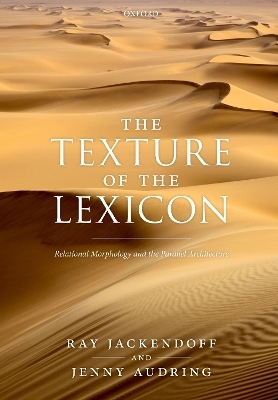
The Texture of the Lexicon
Oxford University Press (Verlag)
978-0-19-882791-7 (ISBN)
In this volume, Ray Jackendoff and Jenny Audring embark on a major reconceptualization of linguistic theory as seen through the lens of morphology. Their approach, Relational Morphology, extends the Parallel Architecture developed by Jackendoff in Foundations of Language (2002), Simpler Syntax (2005), and Meaning and the Lexicon (2010). The framework integrates morphology into the overall architecture of language, enabling it to interact insightfully with phonology, syntax, semantics, and above all, the lexicon.
The first part of the book situates morphology in the language faculty, and introduces a novel formalism that unifies the treatment of all morphological patterns, inflectional or derivational, systematic or marginal. Central to the theory is the lexicon, which both incorporates the rules of grammar and explicitly encodes relationships among words and among grammatical patterns. Part II puts the theory to the test, applying it to a wide range of familiar and less familiar morphological phenomena. Part III connects Relational Morphology with issues of language processing and language acquisition, and shows how its formal tools can be extended to a variety of linguistic and nonlinguistic phenomena outside morphology. The value of Relational Morphology thus lies not only in the fact that it can account for a range of morphological phenomena, but also in how it integrates linguistic theory, psycholinguistics, and human cognition.
Ray Jackendoff is Seth Merrin Professor Emeritus and former co-director of the Center for Cognitive Studies at Tufts University; he is currently a Research Affiliate in Brain and Cognitive Sciences at MIT. He has written widely on syntax, semantics, the architecture of grammar, the evolution of language, music cognition, and consciousness. He was the recipient of the 2003 Jean Nicod Prize and the 2014 David Rumelhart Prize, and has served as President of both the Linguistic Society of America and the Society for Philosophy and Psychology. He is the author of the OUP volumes Foundations of Language: Brain, Meaning, Grammar, Evolution (2002), Simpler Syntax (with Peter Culicover, 2005), Meaning and the Lexicon: The Parallel Architecture 1975-2010 (2010), and A User's Guide to Thought and Meaning (2012). Jenny Audring is Assistant Professor of Linguistics at Leiden University. She specializes in morphology and has written extensively on grammatical gender. Her research interests range from linguistic complexity and Canonical Typology to Construction Morphology and morphological theory. She is the co-editor, with Francesca Masini, of The Oxford Handbook of Morphological Theory (OUP, 2018) and, with Sebastian Fedden and Greville G. Corbett, of Non-Canonical Gender Systems (OUP, 2018).
Part I: The Theory
1: Situating morphology
2: The functions of schemas
3: Motivation in the lexicon
Part II: Using and refining the tools
4: Formalizing morphological phenomena
5: Formalizing inflection
6: Morphologically conditioned phonological alternations
Part III: Beyond morphological theory
7: Language processing and language acquisition through the lens of Relational Morphology
8: Applying the tools to other domains
9: Coda: What have we done?
References
Index of words and schemas
Index of authors and subjects
| Erscheinungsdatum | 29.12.2021 |
|---|---|
| Verlagsort | Oxford |
| Sprache | englisch |
| Maße | 173 x 247 mm |
| Gewicht | 580 g |
| Themenwelt | Geisteswissenschaften ► Sprach- / Literaturwissenschaft ► Sprachwissenschaft |
| ISBN-10 | 0-19-882791-1 / 0198827911 |
| ISBN-13 | 978-0-19-882791-7 / 9780198827917 |
| Zustand | Neuware |
| Haben Sie eine Frage zum Produkt? |
aus dem Bereich


